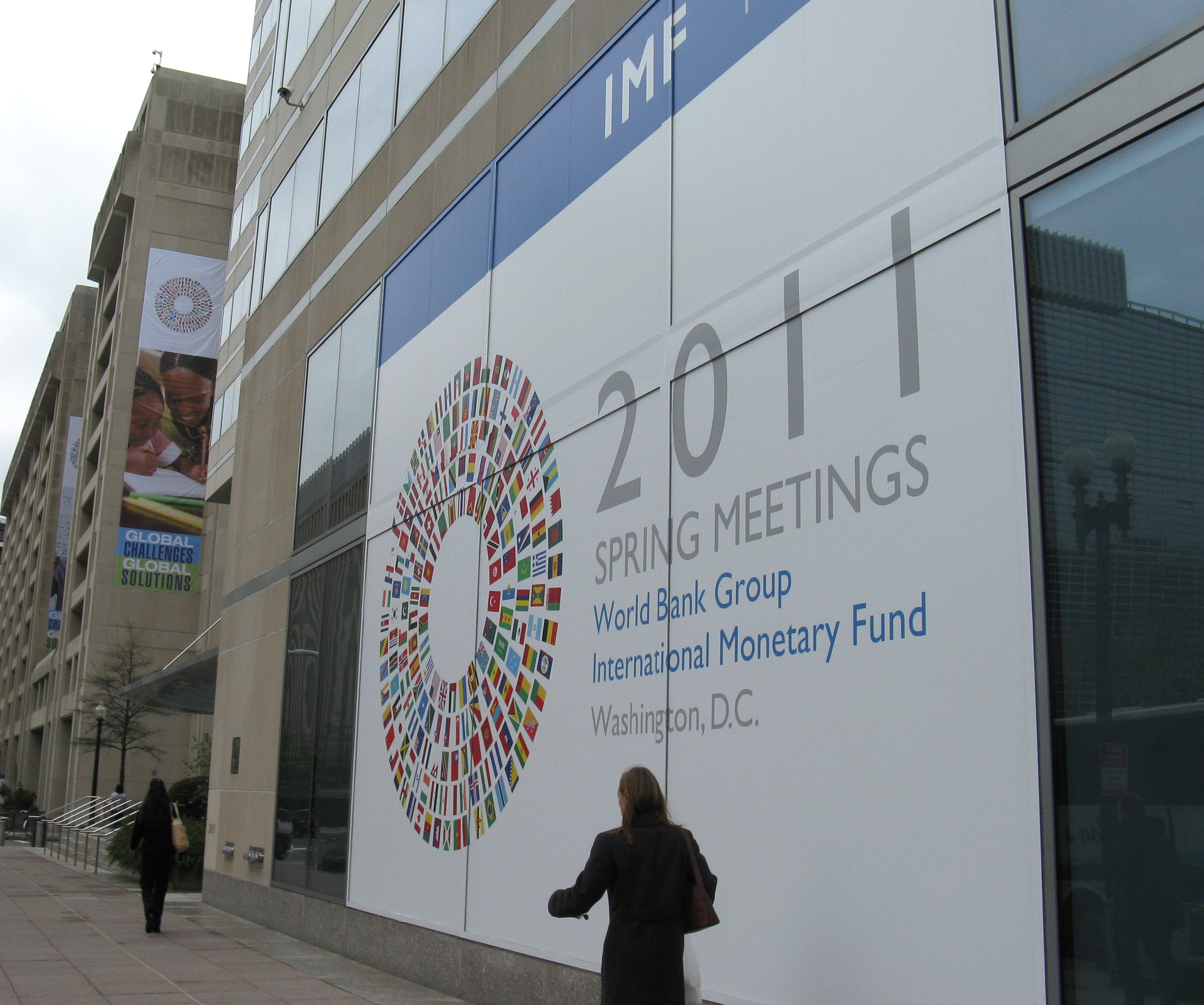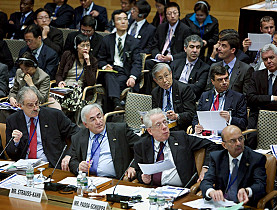Swiss bloom as IMF prepares spring meeting

The global economic recovery may be patchy but, according to the International Monetary Fund (IMF), Switzerland remains in a relatively good position.
Its assessment comes as the IMF prepares to hold its spring meetings with the World Bank this weekend in Washington, which Switzerland will be attending.
The Swiss delegation, headed by Finance Minister Eveline Widmer-Schlumpf, has now arrived and will already take part in some meetings on Friday.
In the “two-speed recovery”, as the IMF has described it in its recent global economy assessment, emerging countries are seeing the largest growth – even if China is expected to see a certain slowdown and India a definite one.
The IMF is also worried about continuing high unemployment – largely falling on young people’s shoulders – which could have serious consequences for social cohesion in many countries, not just in North Africa and the Middle East.
It says the crisis has created an additional 30 million people without jobs around the globe, and that projected economic growth is not enough to plug the gap.
The organisation projects growth of up to three per cent for the United States for 2011-2012. It has also criticised the Obama administration for not yet having an adequate plan against the housing crisis, which was a key element in the global downturn in 2007 and which is linked to the rise in long-term joblessness.
Switzerland, an island
In this context, Switzerland, which has a current jobless rate of 3.4 per cent, appears to be an island of employment.
In its country report published at the end of March, the IMF said that not only were Switzerland’s output and employment “above pre-crisis levels” but that the country was also experiencing strong expansion “in spite of the Swiss franc appreciation”.
But the IMF did warn that there was a danger of a bubble in the housing market if lax credit practices continued. It called on Bern to adopt preventive measures to stop what it called risky measures.
In addition, the IMF pointed to what it delicately called the “two large banks” – UBS and Credit Suisse – remaining a risk for the domestic economy. It urged parliament to adopt swiftly the “too big to fail” proposal, saying that strengthening capital, as outlined in the text, would be key for reducing risk.
Furthermore, it advised Switzerland to boost financial supervision and regulation concerning banks.
Global rethink
For his part, the head of the IMF, Dominique Strauss-Kahn, has called for a stronger global architecture for banks and other private financial institutions.
“We need a tax on financial activities to force this sector to bear some of the social costs of its risk-taking behaviour,” he said earlier this month.
“We need better resolution mechanisms to end the scourge of too big or too important to fail.”
The measures outlined by Strauss-Kahn go further than those of the G20, which the IMF head considers to be too lax to avoid fresh financial crises.
It is this last point that has concerned the Independent Evaluation Office (IEO), a body which looks into IMF policies and activities and which was set up in the wake of the Asian crisis of 1997.
A recent report found that, just as with the Asian crisis, the IMF did not see the global downturn coming. For example, just as the crisis was starting, the IMF called Iceland’s medium-term prospects “enviable”. Iceland’s banking system collapsed in 2008.
Blind IMF
The IEO found that there were a number of factors in play over the failure to see the global crisis, including an intellectual approach and a general mindset that a major financial crisis in large advanced economies was unlikely.
Other factors were IMF internal bureaucracy, support for financial sector instruments such as monetisation of high-risk subprime mortgage loans, and political pressure from the US, Britain and the euro zone.
All this, the report concluded, stems from an ultraliberal ideology that has been in fashion since the 1980s.
The only exception, it said, was the IMF’s greater surveillance of Switzerland, “where IMF staff were more willing to express concerns and provide advice regarding the financial system during bilateral surveillance – something that was appreciated by the Swiss authorities”.
Despite this, the IMF remained “relatively upbeat” about the country until the crisis, it was noted.
The IEO has therefore urged the IMF to keep on reforming its culture, governance and practices, so that it is better prepared to confront future challenges.
It needed the ability to “speak truth to power” not only towards IMF member states but also within its own organisation, the IEO concluded.
The International Monetary Fund was set up alongside the World Bank in 1945 as part of the so-called Bretton Woods institutions.
The IMF monitors the world economies, lends to members in economic difficulty and provides technical assistance to secure financial stability and reduce poverty.
The financial contributions of its 187 member countries are proportional to the importance of a country’s economy. This also defines their share of the votes.
Switzerland joined in 1992 following a nationwide vote.
Swiss delegation: Led by Finance Minister Eveline Widmer-Schlumpf, it will also include Economics Minister Johann Schneider-Ammann, and Philipp Hildebrand, Swiss National Bank chairman.
Topics: The most important topics of discussion in the International Monetary and Financial Committee will be the state of the global economy and the future role of the IMF in the international financial and monetary system.
Volatility: The focus of the discussions in the Development Committee (DC) will be the volatility of food prices, reforms to the World Bank and the progress on achieving the Millennium Development Goals.
IMF role: Discussions will deal with various measures to strengthen the international financial and monetary system, as was discussed in the last ministerial meeting of the G20. The key topics are possible measures to stabilise capital flows, global financial safety nets, the role of Special Drawing Rights (SDRs) and the strengthening of financial sector monitoring by the IMF.
(Source: Swiss government statement)
Growth: 2.4% (2011), 1.8% (2012) – after 2.6% in 2010
Unemployment: 3.4% (2011), 3.3% (2012) – instead of 3.6% in 2010
Inflation: 0.9% (2011), 1% (2012) – compared with 0,7% in 2010
(Translated from French by Isobel Leybold-Johnson)

In compliance with the JTI standards
More: SWI swissinfo.ch certified by the Journalism Trust Initiative














You can find an overview of ongoing debates with our journalists here . Please join us!
If you want to start a conversation about a topic raised in this article or want to report factual errors, email us at english@swissinfo.ch.